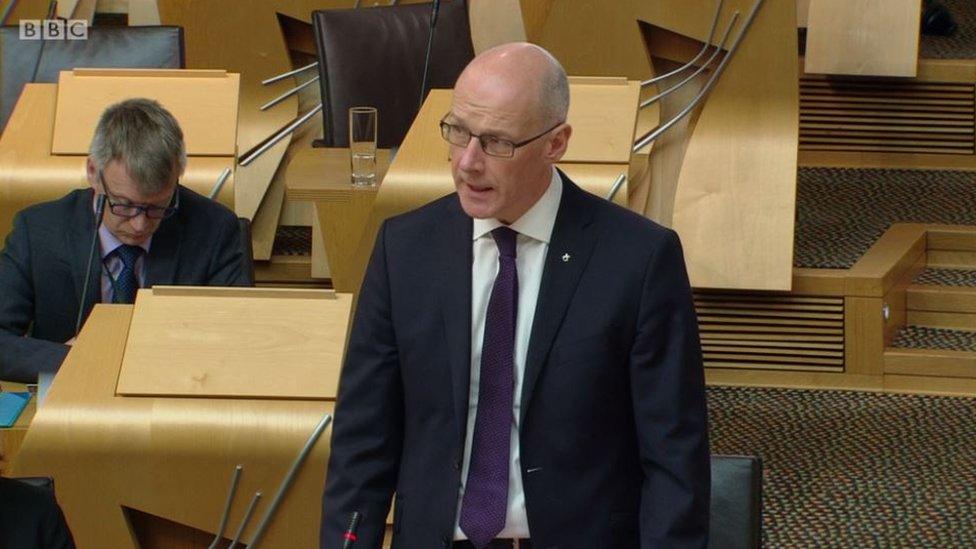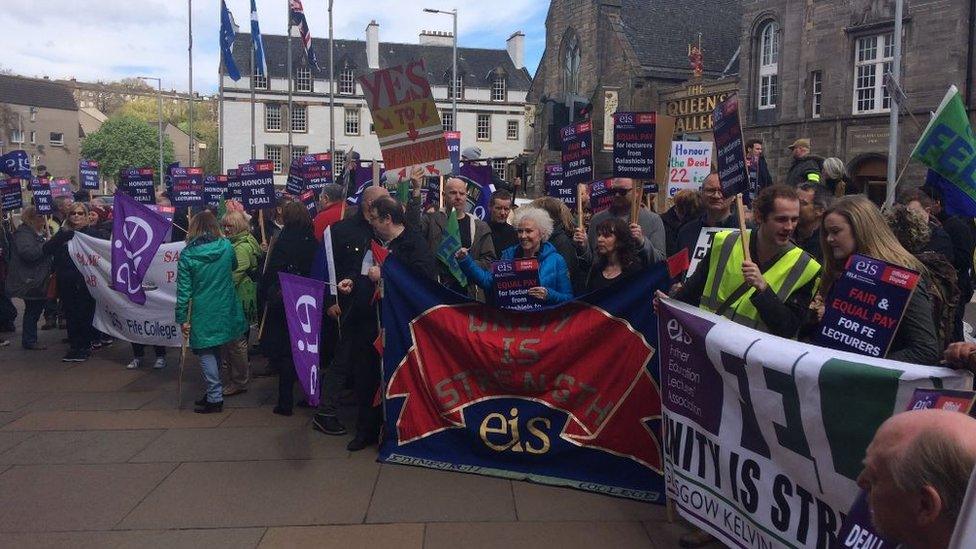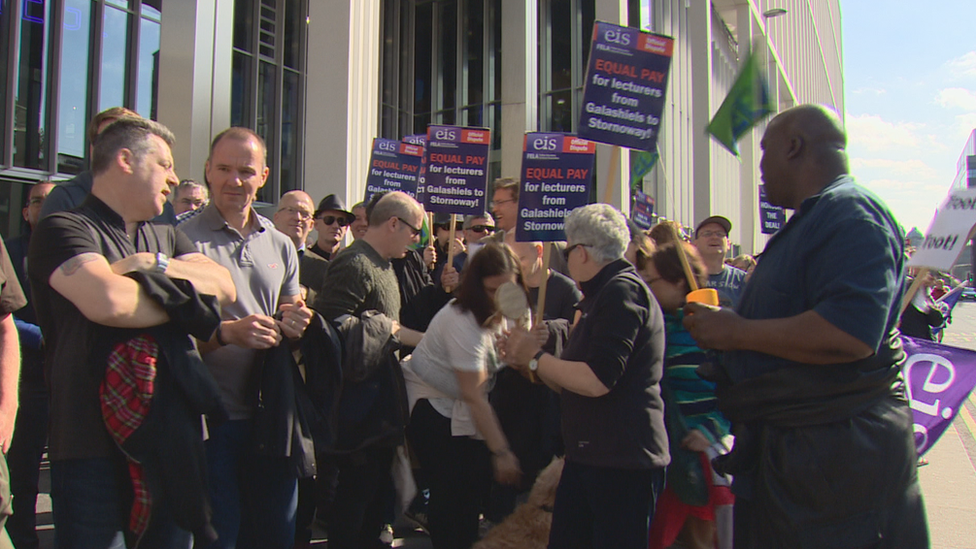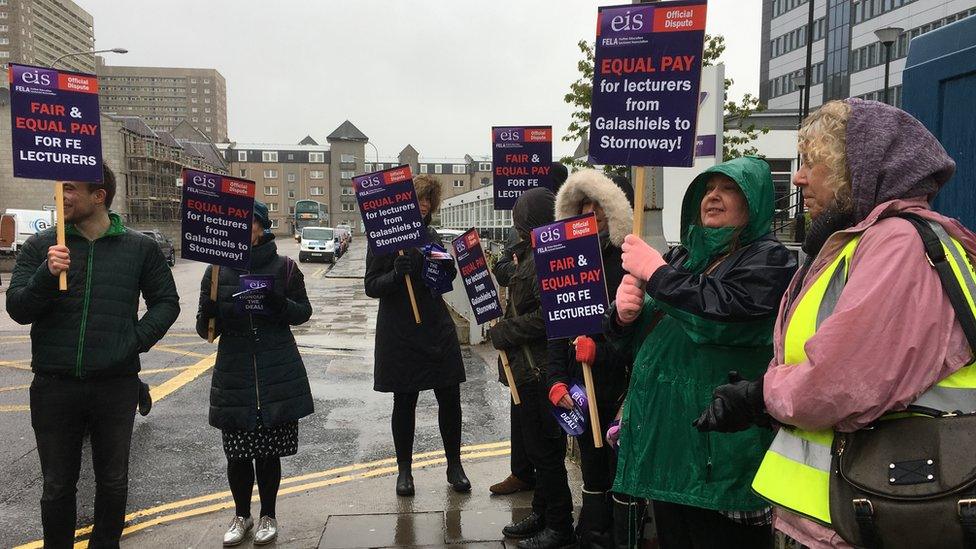Education secretary intervenes in Scots college dispute
- Published

John Swinney said he did not want to force a resolution to the talks, but urged the two sides to come to an agreement
Education Secretary John Swinney has intervened in talks between striking lecturers and their college bosses.
Lecturers have mounted a series of strikes in a dispute over issues including pay and teaching hours.
Mr Swinney said he would not force a resolution, but urged unions to call off the strikes during talks overseen by a government-appointed mediator.
However, union bosses said strikes would continue "for as long as necessary", with new dates agreed.
Lectures are due to strike on Wednesday, and for three days the following week.
Mr Swinney made a statement at Holyrood updating MSPs on the dispute between lecturers and bosses, which he said stemmed from the terms of an agreement originally struck in March 2016.
Employers want a national pay award to be linked to an agreement on harmonised terms and conditions, while the Educational Institute of Scotland insists they should be separate.
The two sides also disagree on what these terms and conditions should be; employers want 24 hours per week of core teaching time for the majority of lecturers, while the EIS proposes up to 22.
On annual leave, employers want existing staff to maintain their current entitlement, with new staff getting 56 days per year. The unions want 64 days per year for all lecturers.
Mr Swinney said strikes were leaving students "at real risk in this crucial end of year period", something he was was "not acceptable".
The minister said he had formally intervened in the dispute and met with both sides on Sunday, saying there would be "a significant change to the way the talks will be conducted from now on".


College lecturers on strike outside the Scottish Parliament
Analysis by BBC Scotland Education Correspondent Jamie McIvor
This is now the most serious national strike in Scottish education since the long-running teachers' dispute in the 1980s.
Students have now lost five days with their lecturers over just four weeks and more strikes are planned. Some students are becoming anxious as exams and deadlines approach.
Talks have made progress but there is still some way to go towards resolving the differences.
The EIS offered to call off strikes on three occasions if colleges agreed to implement the pay deal. The union said it would then commit to agreeing the terms and conditions. It says the last thing members want to do is harm students.
Colleges believe the cost of the pay deal could lead to further cuts elsewhere if conditions are not addressed.
Colleges went through a major shake up a few years ago - overall budgets were cut, the number of part-time students fell and jobs went. Local colleges across the country merged into so-called regional supercolleges and national pay bargaining was re-introduced.
The process has sometimes been difficult for staff but many colleges and the Scottish government believe the sector is now in a better place than it was.
However, the longer the strike continues the more damaging it is likely to be.

The Scottish government has appointed John Sturrock QC to mediate in the talks, "charged with seeking to help the parties break the deadlock".
Mr Swinney said: "I asked the EIS to suspend the planned strikes due to take place this week and going forward while this process of active dispute resolution is in progress. I asked that the union give this careful consideration following our meeting and I reiterate that request today.
"I want this dispute to end and I want agreement to be reached on harmonising pay and terms and conditions for colleges staff through national bargaining. For the Scottish government to directly intervene and force a resolution would mean the end of national bargaining. I am not prepared to consider that outcome.
"I therefore urge both parties to work constructively with our independent facilitator to find common ground and achieve an agreement."

EIS general secretary Larry Flanagan welcomed Mr Swinney's intervention, although he said he was "disappointed" that the minister had not put more pressure on Colleges Scotland.
He said: "The EIS emergency committee, which met early this afternoon, has now agreed that strike pay will be payable to support further education lecturers on strike, from tomorrow's action onwards. This represents a substantial financial commitment from the EIS to supporting its members, and highlights our ongoing determination to continue this action for as long as necessary until colleges honour the deal that they signed last year.
"The emergency committee has also agreed a programme of new strike dates, in addition to those previously announced, and these will be communicated to members shortly."
The most recent statement from Colleges Scotland said the group believed it had made "a good offer" and also called for strikes to be suspended.
'Rightly angry'
Opposition politicians criticised Mr Swinney, saying it had taken the government too long to intervene.
Conservative education spokeswoman Liz Smith pointed out that the dispute had been going on for over a year, saying constituents were "very rightly angry" about the impact of strikes on students.
Labour's Iain Gray said it was a "disgrace" that lecturers had to go on strike to get Mr Swinney's attention.
Green MSP Ross Greer said it was "outrageous" of Mr Swinney to ask lecturers to suspend their strike, saying ministers "have been hands-off with this strike when they should have been sticking up for hard-pressed college staff".
And Lib Dem member Tavish Scott also asked why there had not been an earlier intervention, saying there was nothing positive about a strike affecting students and lecturers.
- Published11 May 2017

- Published3 May 2017

- Published27 April 2017
